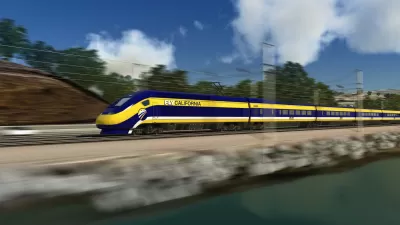All Aboard Florida, the diesel-powered, high speed (125 mph) train connecting Miami to Orlando has ordered new locomotives and coaches with Siemen's Sacramento, California plant. The mostly privately funded train should be running by 2016.
"The trains will be built for maximum speed of 125 mph and will be assembled at Siemens’ solar-powered rail manufacturing hub in Sacramento," writes Paul Brinkmann for the Orlando Sentinel. The announcement was made on Sept. 11.
Don Robinson, All Aboard Florida president and CEO, said the company chose Siemens believing that it will “set a new industry standard, while providing the world-class amenities our customers will expect from our passenger service.
Siemens’ Sacramento plant, which has been in operation for almost 30 years, is up to 80 percent powered by two megawatts of solar energy and employs more than 800 people.
The train system will be built in two phases: Miami to West Palm Beach by 2016, and then extended to Orlando International Airport a year later. Five sets of trains will serve the initial route, "consisting of two diesel-electric locomotives, one on each end of four passenger coaches," writes Brinkman.
Expansion to seven coaches per train is anticipated eventually, and All Aboard expects to purchase an additional five sets of trains for the segment from West Palm Beach to Orlando International Airport.
The station platforms will allow for level boarding to greatly increase accommodation of those in wheelchairs, and those using bikes and strollers. And yes, the trains will have wi-fi.
According to the train's press release, "All Aboard Florida will be the first privately owned, operated and maintained passenger rail system in the United States," but Curtis Tate of McClatchy Washington Bureau notes "it did apply for a $1.6 billion loan from the Federal Railroad Administration. If the agency approves the loan, it would be the largest awarded under the Railroad Rehabilitation and Improvement Financing program."
FULL STORY: Siemens to build All Aboard Florida trains

Planetizen Federal Action Tracker
A weekly monitor of how Trump’s orders and actions are impacting planners and planning in America.

Congressman Proposes Bill to Rename DC Metro “Trump Train”
The Make Autorail Great Again Act would withhold federal funding to the system until the Washington Metropolitan Area Transit Authority (WMATA), rebrands as the Washington Metropolitan Authority for Greater Access (WMAGA).

The Simple Legislative Tool Transforming Vacant Downtowns
In California, Michigan and Georgia, an easy win is bringing dollars — and delight — back to city centers.

The States Losing Rural Delivery Rooms at an Alarming Pace
In some states, as few as 9% of rural hospitals still deliver babies. As a result, rising pre-term births, no adequate pre-term care and "harrowing" close calls are a growing reality.

The Small South Asian Republic Going all in on EVs
Thanks to one simple policy change less than five years ago, 65% of new cars in this Himalayan country are now electric.

DC Backpedals on Bike Lane Protection, Swaps Barriers for Paint
Citing aesthetic concerns, the city is removing the concrete barriers and flexposts that once separated Arizona Avenue cyclists from motor vehicles.
Urban Design for Planners 1: Software Tools
This six-course series explores essential urban design concepts using open source software and equips planners with the tools they need to participate fully in the urban design process.
Planning for Universal Design
Learn the tools for implementing Universal Design in planning regulations.
Smith Gee Studio
City of Charlotte
City of Camden Redevelopment Agency
City of Astoria
Transportation Research & Education Center (TREC) at Portland State University
US High Speed Rail Association
City of Camden Redevelopment Agency
Municipality of Princeton (NJ)



























